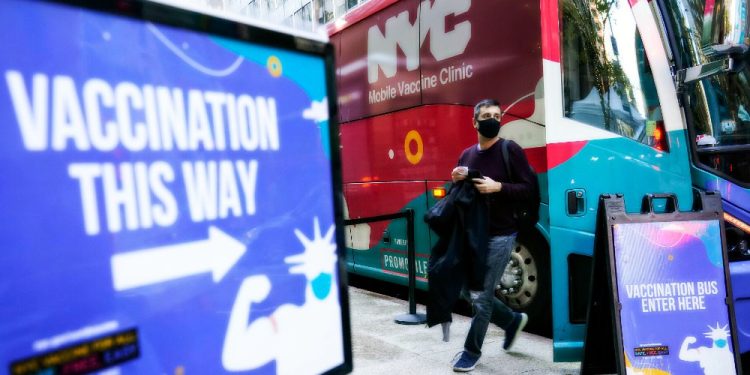New York City health officials regularly overpaid a contractor to administer COVID-19 tests and vaccines, paying as much as $14,050 for a single COVID-19 vaccination, an audit shows.
Officials let Executive Medical Services, a contractor awarded a contract early in the COVID-19 pandemic, to set its own staffing levels, leading to uncontrolled costs, New York City Comptroller Brad Lander found.
That led to exorbitant costs and low efficiency, with an analysis of invoices showing that only one vaccination was administered for every two billed hours.
“Emergency contracting allows the City to stand up vital services in times of crisis, but demands heightened vigilance to safeguard the fiscal interests of the City. Our audit reveals significant weaknesses in the control mechanisms that impact past, present, and potentially future emergencies. By addressing these challenges head-on, agencies can better spend New York City’s taxpayer dollars wisely and efficiently, even in crises,” Lander, a Democrat, said in a statement.
The New York City Department of Health and Mental Health Services, which paid Executive Medical Services, did not respond to a request for comment.
Executive Medical Services, also known as Affiliated Physicians, did not return an inquiry.
Contract
The agency originally agreed to pay Executive Medical Services up to $500,000. After six amendments to the contract, stretching it through the end of 2022, the agency paid the contractor some $390 million.
The contract paid Executive Medical Services to create long-term and temporary, or popup, sites for COVID-19 testing or vaccination. Out of 302 sites, 267 were temporary.
Lander’s office investigated to see whether the Department of Health made sure payments to the contractor were legal, that staffing levels were reasonably aligned with demand, and whether sites were established equitably under the contract provisions.
While auditors found sites were set up in communities heavily impacted by COVID-19, as required, and that invoices were usually supported by documentation, they uncovered concerning data on staffing levels and costs.
The department “did not adequately control or monitor staffing levels,” Lander’s office said.
Under the contract, Executive Medical Services would be paid $150 per hour all sites, plus $100 per test administered and $25 per vaccine administered. The department was the party responsible for monitoring contractor performance, but the plan lacked standards for whether sites were appropriately staffed based on demand, auditors said. That left the department with “limited means of effectively controlling expenditures or minimizing waste.”
Auditors analyzed a sample of 49 invoices and documentation for the invoices and found that one test was administered per 1.6 staff hours, and that one vaccination was administered every two staff hours.
Auditors also found ballooning costs, including payments of up to $14,050 for each vaccination administered and payments of up to $2,040 for each test carried out.
Costs ranged significantly across different sites. The lowest payment per vaccine administered was $70, and the lowest payment per test carried out was $128.
The agency told auditors that it helped set staffing levels according to U.S. Centers for Disease Control and Prevention guidance and that a number of workers did not directly administer tests or vaccinations, including managers and observers. Officials said staffing numbers were “pre- determined based on the layout of a particular venue, number of vaccine products offered and anticipated demand.”
“The lives of New Yorkers were saved because of the City’s efforts to provide testing and vaccination services. It is not possible to place a monetary value on a life,” officials added.
Other Failings
The audit also found that officials began requiring the contractor to submit daily summary reports in December 2020.
The reports included the number of staffers at each site as well as the work performed.
The reports were supposed to be signed by an Executive Medical Services worker as well as a Department of Health employee.
A sample review, though, found that a quarter of the reports were not signed by the latter.
The lack of approval by the department means the agency “did not have independent confirmation” of data from some sites before paying the contractor, auditors said.
In another failing, the department did not complete a vendor performance evaluation for the contract within a timeframe required by the city’s Procurement Policy Board.
Recommendations
Auditors recommended that the department develop a standardized process for how staffing levels are set for contracts, conduct regular analyses of contracts to make sure they’re being met in an efficient manner, and to make sure the evaluations are filled out as required.
The department agreed with those recommendations.
The department diverged from the comptroller on two other recommendations.
Officials said processes are already in place for making sure certain documents, such as the summary reports, are signed by agency staff, and for documenting why sites are opened or closed.
Lander’s office told agencies in a letter after the audit was published that they should take steps to make sure emergency contractors are handled well.
Article cross-posted from our premium news partners at The Epoch Times.





